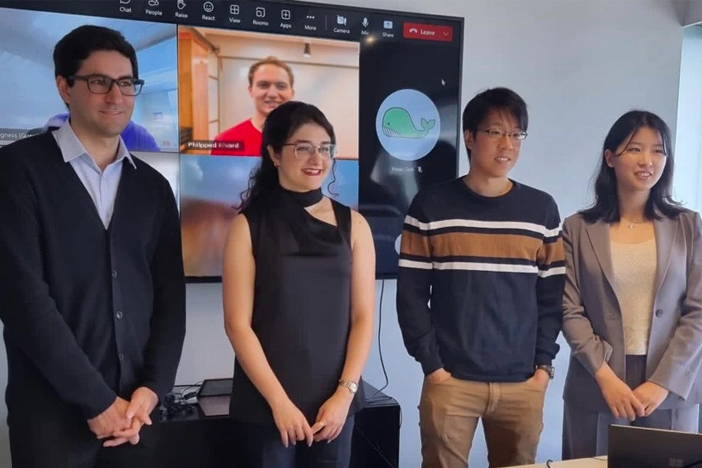Just two years after launch, artificial intelligence company MACSO has closed their second funding round, oversubscribed.
“We were seeking NZ$2 million and we’ve closed with NZ$2.4 million,” said Saba Samiei, CEO and Founder of MACSO. “Investor confidence is testament to the success we’re seeing for our early applications, both in New Zealand and offshore.”
Auckland-based MACSO is building an AI sensory fusion platform. They have already commercialised an AI ‘ear’, building both hardware and software, which listens for early signs of crippling respiratory illnesses in livestock. Partnering with Canadian hardware manufacturer Piera Systems, they have built an AI ‘nose’ which immediately detects vaping or cigarette fumes and sends out alerts. Both sensors are affordable for users: farmers and schools. Computing takes place on microcontrollers which means they consume minimal power and monitoring of coughing in pigs and vaping amongst students takes place in real time.
“MACSO has closed a remarkable investment round. MACSO’s brilliant team unites vision and execution in shaping a better future through the use of AI,” Samar Alrayyes, Director at MACSO and Senior Client Executive at Microsoft.
Farms deploying the ‘ear’ in the USA have reduced death rates for nursery pigs by up to 70%, saving animals’ lives and farmers’ livelihoods. The ‘nose’, aptly named the ‘Canāree’ monitor, is being rapidly adopted in schools across North America and Australia to manage the global vaping epidemic.
“The beauty of Canāree monitors is that unlike any other vaping monitor available, it distinguishes between vaping and any deodorants or air fresheners that students use to mask the fumes,” said Samiei. “Canāree detects the most minute aerosol particles and immediately alerts staff. We’re just starting trials in New Zealand schools.”
Accolades are accumulating. On 16 June, in Sydney, at the Women in AI APAC Awards, Saba Samiei won the award for AI in Agribusiness and Rural Development and scooped the ultimate honour of Innovator of the Year, beating 19 other winners to the prize. “The possibilities for our sensory monitors are limitless,” said Samiei. “Our ‘ear’ can be taught to detect any type of acoustic event and the Canāree monitor can be taught to detect any type of aerosol and intelligently determine whether it poses a threat to the surrounding environment or people. With a strong roadmap to enable multiple sensors, ultimately, we envisage the ability to prevent massive catastrophes by fusing those sensors.”
Saba is a shining example of a young female tech entrepreneur. Originating from Iran, she emigrated to New Zealand in 2012 to study for post graduate studies at Unitec and later her Masters at AUT. While building a successful corporate career, she founded MACSO.
“After six years of research, I had identified a gap in the technologies and applications of AI,” said Saba. “Most applications focused on character recognition, language and robotics while nothing existed that could intelligently make decisions based on sensory inputs from our environment.”
Enter deep tech incubator, Bridgewest Ventures. They were seeking a deep tech company with the AI technical skills to build and commercialise a solution to address African Swine Fever which killed 43.5 million pigs in 2018 in China and Porcine Reproductive and Respiratory Syndrome which costs the US pork industry around US$50 billion each year.
From April 2021, in just 24 months, Saba built a multinational team, raised more than NZ$3.5m, built a solution and began deploying it at scale. MACSO employs six highly skilled people in New Zealand and America and has six highly knowledgeable people on the board.
“Oversubscription of MACSO's recent funding round is testament to the strength of the team, the innovative solutions they offer, and the trust that investors place in the vision to deploy Artificial Intelligence through inventive sensor-based solutions,” said Saum Vahdat, CEO of Bridgewest Ventures New Zealand.
MACSO has succeeded in installing algorithms into microcontrollers that perform inference at the edge. They deliberately use lightweight neural networks which are compressed even further to sit on the edge computing device.
The proprietary algorithms can remotely upgrade neural networks on the edge – no need to recall devices that are already deployed in the field for costly upgrades. Computing takes place on the device itself, independently of the cloud. Edge computing hugely reduces the carbon footprint of the continuously running cloud-based models needed for operating the solutions. This meets one of the core ethical goals for MACSO.
"When someone looks up MACSO a hundred years from now, I want them to ask what the world would have been like without us, "said Saba.
The lead investor in MACSO is Bridgewest Ventures, the NZ arm of Bridgewest Group in the USA. Other investors are Booster, NZGCP, Pacific Channels, AIM, Snowball platform and family offices.



